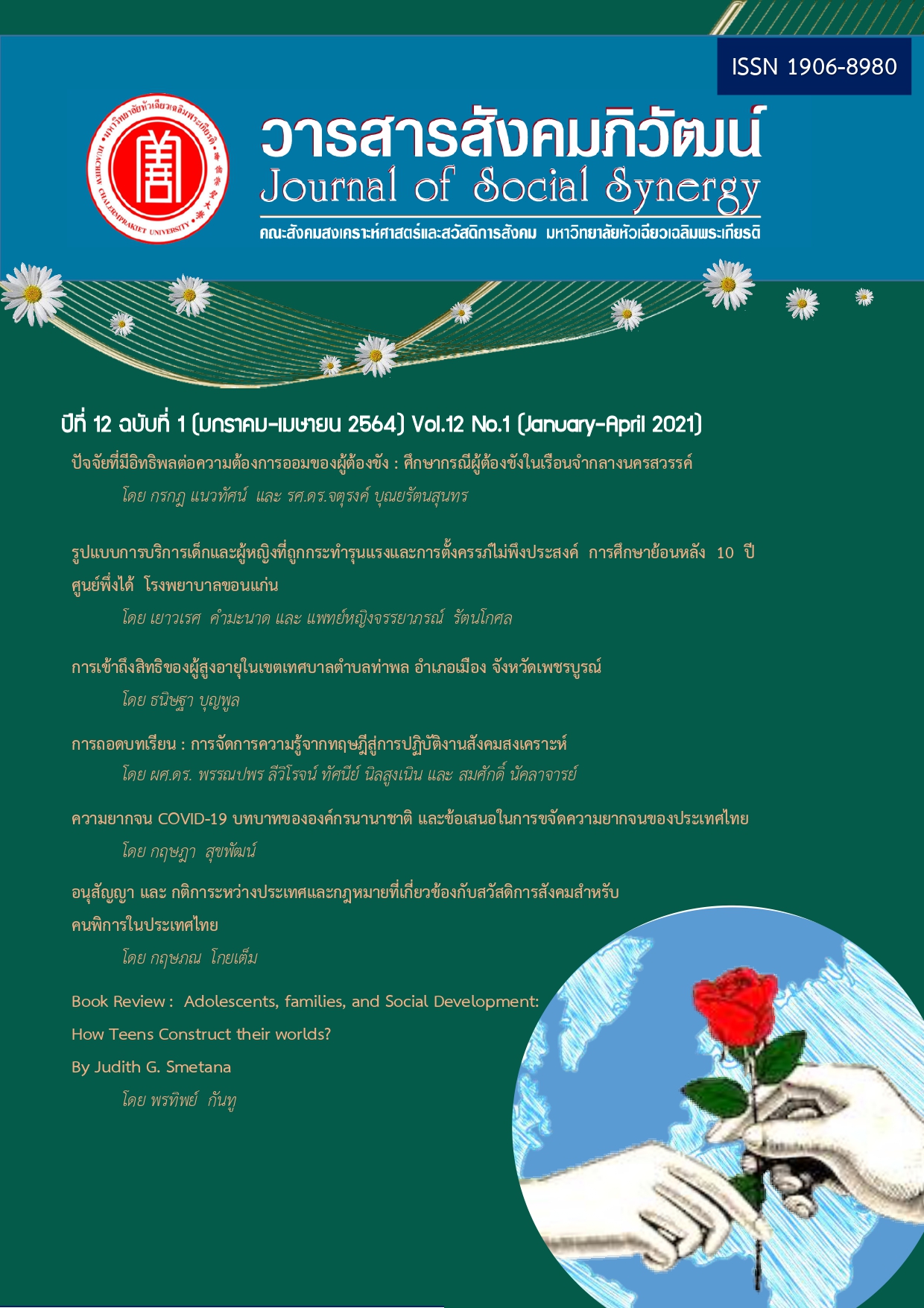The study of service models for child and women abused and unwanted pregnancy. A retrospective descriptive study in the past 10 years: One Stop Crisis Center Khon Kaen hospital.
Keywords:
child and women abused, unwanted pregnancy, One Stop Crisis CenterAbstract
The study of service models for child and women abused and unwanted pregnancy. A retrospective descriptive study in the past 10 years: One-Stop Crisis Center Khon Kaen hospital there are objectives to study the violent situations and unwanted pregnancy in the family in the past to take the results to improve the services of One-Stop Crisis Center to gain more efficiency. The research method is a retrospective descriptive study through the database of One-Stop Crisis Center and Medical record in the hospital, as well as the data recording online program of services for child and women, abused and unwanted pregnancy from Health Administration Division of Ministry of Public Health between October 1st, 2009 to September 30th, 2019. The study uses the sample group of 6,299 persons including children and women was abused in a family of 5,841 people and unwanted pregnancy of 458 people. The study results founded that children and women who were sexual violence victims came to the One-stop crisis center the most and physical violence victims respectively. The service models which are multidisciplinary team include: 1) Medical services: Treatment from physical violence cases, Sexual violence cases assessment, Pregnancy assessment and providing contraceptive pills, Laboratory investigation, and Forensic and medical evidence. 2) Psychological services: Psychotherapy and Family therapy, 3) Medical social work services: Empowerment counseling, Risk assessment of repeat violence and Family readiness assessment after getting medical treatments, Coordination toward the related organization outside the hospital and the staffs of The Child Protection Act and Victims of Domestic Violence Victim Protection Act. The services of unwanted pregnancy include 1) Option counseling 1.1) Post-alternative counseling and decided to continue pregnant, there are services provided including social welfare supporting and consumer goods, contraceptive, Home health care, and temporary adoption referral for the child after birth at the Children home welfare. 1.2) Post-alternative counseling and decided to get an abortion, there are services provided including abortion in Hospital, providing the referral of safe abortion network, providing the suggestion for contraceptive after abortion, home visiting and supporting payment in the abortion.
References
กิ่งกาญจน์ คงสาคร. (2559). ผลของโปรแกรมเสริมสร้างพลังอำนาจต่อการถูกกระทำรุนแรงในสตรีตั้งครรภ์ : การวิจัยเชิงทดลองแบบสุ่ม. วารสารพยาบาลกระทรวงสาธารณสุข, 26(1): 27-39.
ธวัช วงศ์สง่า. (2543). แรงจูงใจทางสังคมและวัฒนธรรมที่ส่งเสริมการกระทำรุนแรงของบิดามารดาในเขตกรุงเทพมหานคร. กรุงเทพฯ : จุฬาลงกรณ์มหาวิทยาลัย.
พรทิพย์ คะนึงบุตร , ดรุณี ชุณหะวัต และ พัชรินทร์ นินทจันทร์. (2554). การประเมินผลการดำเนินงาน ศูนย์พึ่งได้ (One Stop Crisis Center) โรงพยาบาลปทุมธานี. วารสารการพยาบาลจิตเวชและสุขภาพจิต, 25(1): 75-86.
ศิริพร จิรวัฒน์กุล. (2559). การให้คำปรึกษาทางเลือกสำ หรับวัยรุ่นที่ตั้งครรภ์. วารสารสภาการพยาบาล, 31(2): 5-16.
สุธน ปัญญาดิลก และเรณู ชูนิล. (2554). โครงการวิจัยการบริหารจัดการระบบการวางแผนครอบครัวของ ประเทศไทย. นนทบุรี : สำนักอนามัยการเจริญพันธุ์ กระทรวงสาธารณสุข.
World Health Organization. (2014). Global and regional estimates of violence against women: prevalence and health effects of intimate partner violence and nonpartner sexual violence. Geneva, World Health Organization; 32 -50.
Downloads
Published
How to Cite
Issue
Section
License
บทความที่ได้รับการตีพิมพ์เป็นลิขสิทธิ์ของวารสารสังคมภิวัฒน์ มหาวิทยาลัยหัวเฉียวเฉลิมพระเกียรติ
ข้อความที่ปรากฏในบทความแต่ละเรื่องในวารสารวิชาการเล่มนี้เป็นความคิดเห็นส่วนตัวของผู้เขียนแต่ละท่านไม่เกี่ยวข้องกับมหาวิทยาลัยหัวเฉียวเฉลิมพระเกียรติ และคณาจารย์ท่านอื่นๆในมหาวิทยาลัยฯ แต่อย่างใด ความรับผิดชอบองค์ประกอบทั้งหมดของบทความแต่ละเรื่องเป็นของผู้เขียนแต่ละท่าน หากมีความผิดพลาดใดๆ ผู้เขียนแต่ละท่านจะรับผิดชอบบทความของตนเองแต่ผู้เดียว




